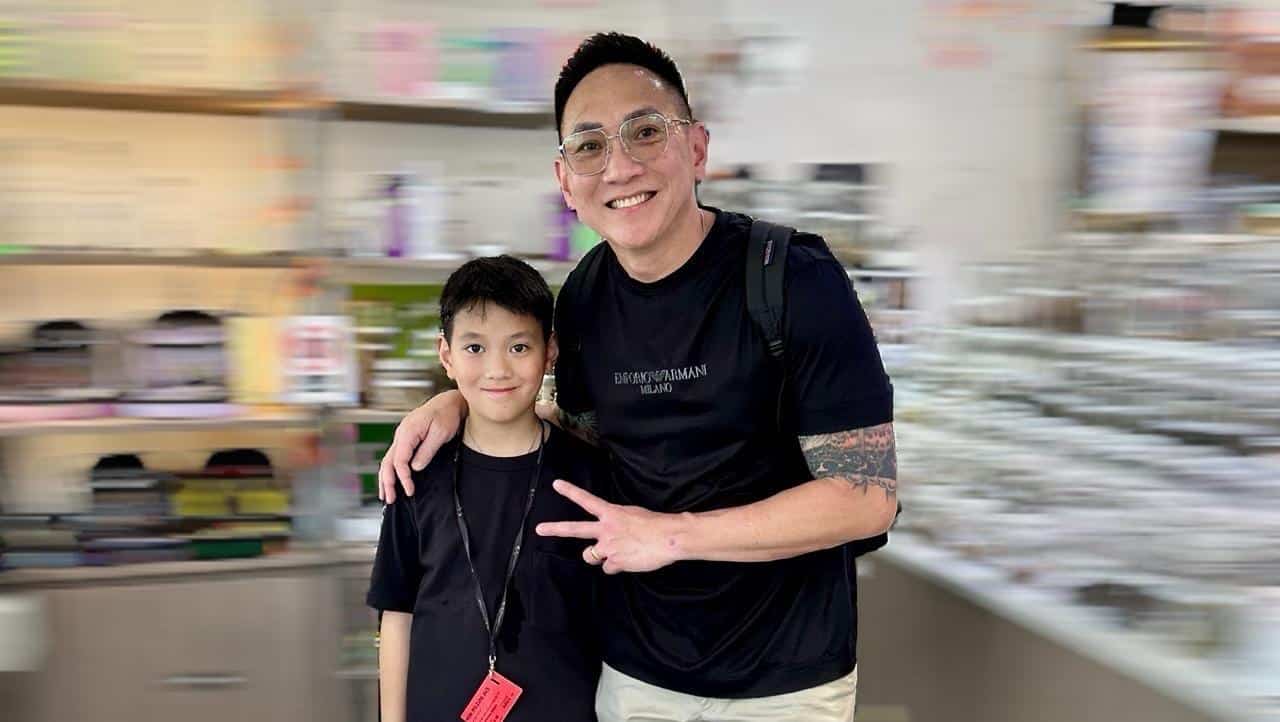“Meet you at the gate”: Prison Gate Ministry helps ex-offenders chart a fresh life
by Christine Leow // April 1, 2022, 3:42 pm

Prison Gate Ministry, under Prison Fellowship Singapore, supports ex-offenders in their new life outside prison walls so they can successfully reintegrate into society. Photo by Artem Beliaikin on Unsplash. All other photos courtesy of Prison Fellowship Singapore.
The day Meng Tat (not his real name) stepped back into society after serving more than five years for drug use and unlicensed money lending, a welcoming party was waiting to meet him at the prison gate.
“I was welcomed by my wife and daughter, and Prison Fellowship Singapore staff and volunteers.”
But there were also two others waiting for him – two guys from his old gang.
“Old gang leaders may not write or visit when you’re inside but I was in the brotherhood for so long, they received me at the prison gate,” said Meng Tat.
Leaving the old gang
Stories abound of gang members routinely receiving their members at the gate when they are released from prison.
Of the homecoming his gang gave him, Meng Tat said: “Xinwei (gratified). But I wanted to change. I wanted to renounce my illegal activities.”
To continue his friendship with his gang would have made that change almost impossible.
“There is nothing wrong with meeting up with them and eating with them. But it is the aftermath, it is what happens after that which worried me, the cycle of what would come back.”
“I wanted to change. I wanted to renounce my illegal activities.”
That day, the whole group went to Changi Village for a quick lunch. Then, in the presence of the “old head and his right-hand man”, Meng Tat renounced his ties with the gang.
“They told me, ‘Want to do good, go do good. Don’t need to renounce’,” he said.
“But I told them, ‘I want to be upfront. It’s not between you and me. You’re still brother, still uncle. This is something different. It’s about renouncing the activities, the culture, the worship.”
Having the support of the Christian Prison Fellowship Singapore (PFS), not just during his prison term but when he was released, helped him tremendously, he said. This is Prison Gate Ministry, the After-Care Ministry of PFS.
Cocooned within the confines of prison, far from the influences of the world and the gang, it had been easy for Meng Tat to leave his past behind.
“I was like a newborn baby in Christ … When I came out, I was asking, ‘Will Jesus be there for me? Will I be shunned?'”
“But internally, I was like a newborn baby in Christ. I had only known Him three to four years.
“So, when I came out, I was asking, ‘Am I making the right decision? Will Jesus be there for me? Will your big community be here or will I be shunned?
“Having a new community to embrace and journey with me was good, not just to talk about God and the Bible. Or else, when I come out there is nobody.”
The experience of After-Care was so transformative for Meng Tat that he decided he wanted to do the same for others. Five years on, he is now a staff with PFS, helping those who have done time in prison.
Beyond prison walls
Prison Gate Ministry is part of the holistic care and counselling support that PFS provides.
When it first started in 1953, PFS provided counselling care for inmates in prison, extending that to include chapel services and Bible study programmes. Over time, PFS realised that for successful rehabilitation to happen, the care needed to go past prison walls and be a long-term effort.
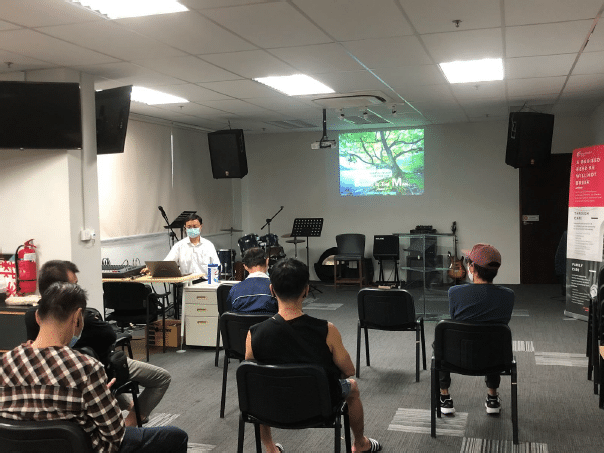
An After-Care Support Group for men.
They started getting volunteers to journey with ex-offenders they had helped in prison. In 2006, Prison Gate Ministry was officially launched as a PFS initiative with a comprehensive programme in place.
“We tell them, ‘When you come out, we’ll pick you up. We’ll meet you at the gate.’”
The programme begins even before the day of release.
Said Meng Tat: “It’s a voluntary basis where the ex-offenders inform their officer they want to be part of our programme.
“Prison Gate ministry staff are then informed that there will be new inmates coming out soon. Six weeks to one month before release, we check up on them.”
It is then that the staff find out the exact kind of help the soon-to-be-released inmate requires.
“We check on their spiritual family, their finances, their background. Were they drug addicts, in gangs, in debt?
“Then, we partner organisations to help them and support them. We tell them, ‘When you come out, we’ll pick you up. We’ll meet you at the gate.’”
Brand-new world
Once out, the immediate needs are pressing.
Said PFS staff Peter Lim, 56: “The first 72 hours of the inmates’ release are the most crucial.
“If they don’t have anything to do, they will call the old number back in their gang. They will say to themselves, ‘My old headman is there. Surely he will help me.’
“But if we are there, it makes a difference.”
“She was anxious and crying. She wanted to go back to prison.”
PFS staff Emily Tan explained to Salt&Light what goes on during those critical few days.
“I had one woman who was sentenced to 36 years in prison. After minus-ing everything, she served 24 years.
“When she came out, I took her to CPF to open a SingPass account. She squatted down on the floor and didn’t want to walk because she saw so many people.”
The decades away from society had made her unused to large crowds and normal life in general.
“She was anxious and crying. She wanted to go back to prison. When she went into prison, it was the 1980s. There was no MRT even.
“When she came out, there was Covid. It’s not easy to go back to society.”
Many who have been incarcerated return to life on the outside sans their support system, as family and friends had long given up on them and moved on.
For those with ties to gangs, their gang friends may feel like the only ones to whom they can turn. Prison Gate Ministry offers an alternative.
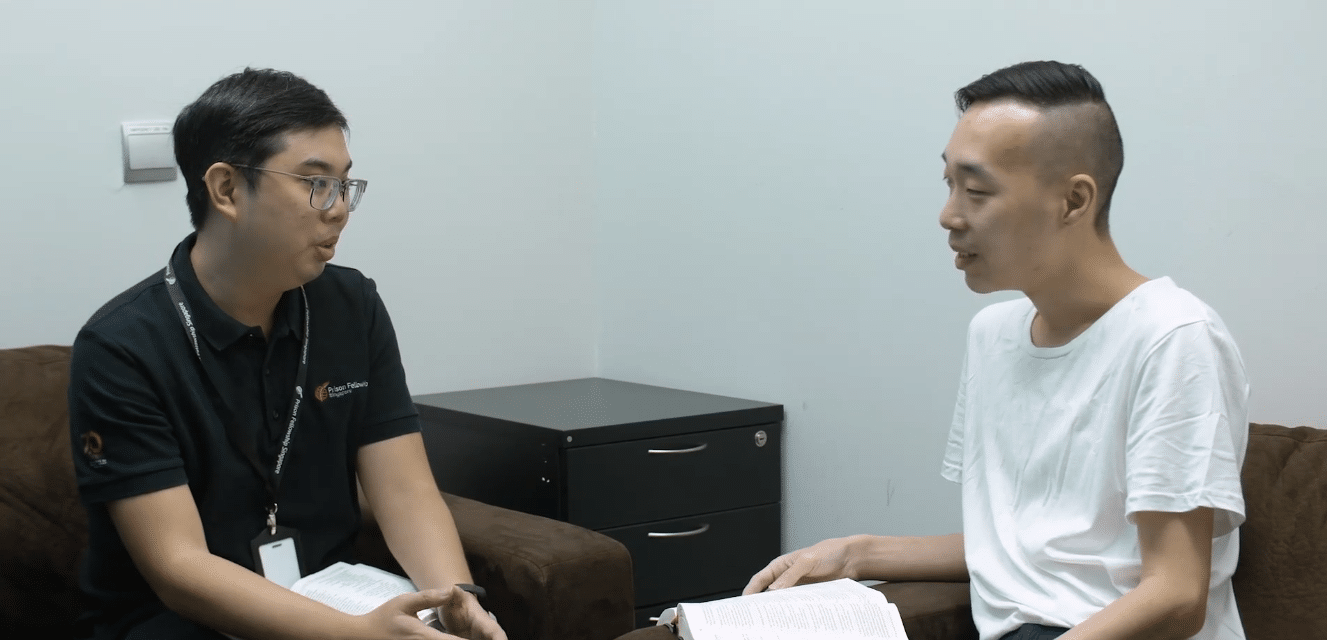
More than just meeting ex-offenders at the gate, Prison Gate Ministry cares for them long after their release, providing one-on-one counselling to help them get used to life outside prison.
Said Meng Tat: “There are a lot of essential things that we help them to tide through. Trace Together, for example. They don’t have that in prison.
“When they were arrested, they were so high that they had nothing with them but a parang.”
“They have no phone number or emails. So, they can’t register for SingPass.
“Some have lost their IC or have lost everything because when they were arrested, they were so high that they had nothing with them but a parang (curved knife).
“They have no bank accounts, don’t know how to save their passwords.
“So, we need to help them, guide them to set all these things up. We are the bridge between In-Care and After-Care.”
New friends
Beyond the essentials which are settled in the first few days of freedom, Prison Gate Ministry offers Bible study, prayer meetings and chapel services, replicating the Christian community the ex-offenders had experienced while in prison.
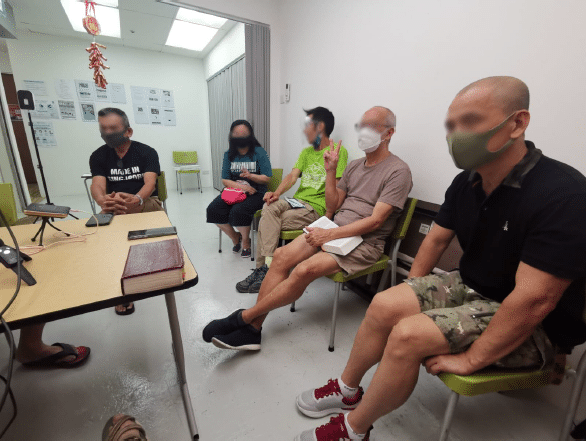
A Bible study class in session.
One-to-one counselling and courses such as Alpha and Purpose Driven Life are offered as well. There are also men and women support groups as well as gatherings to provide ex-offenders with a safe community on which to count.
“Even as they are handed over to the church, we are in communication with the church.”
Added Peter: “We have a Drop In Centre (DIC) at our PFS office where they can come in every day, sit down and chat with our volunteers.
“So, there is a new community for you and new friends. What we give them is fellowship and friendship.”
For the women, Emily runs additional art and craft classes that alternate with the Bible study sessions.
“We can’t just have Bible study or they won’t come. We want to make them comfortable through art and craft.”
Connecting ex-offenders to churches is something else Prison Gate Ministry does. PFS partners 182 local churches to support ex-offenders.
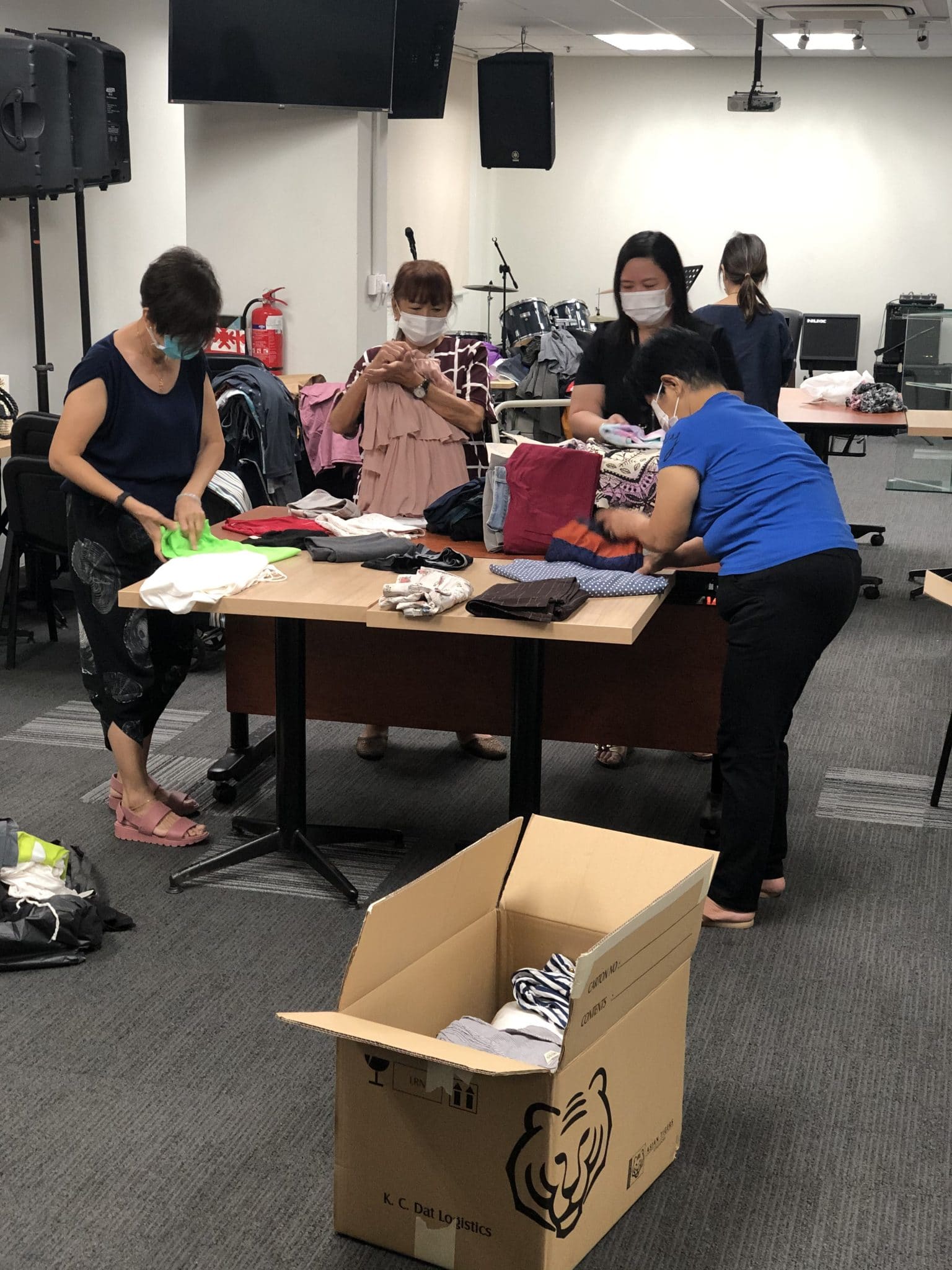
Women beneficiaries engaging in art and craft work which alternates with Bible Study sessions.
“Even as they are handed over to the church, we are in communication with the church for updates and follow-up on them,” said Meng Tat.
At any one time, Prison Gate Ministry is helping some 100 ex-offenders reintegrate into society.
Hardships and heartaches
But the work at Prison Gate Ministry can be challenging.
Recounted Emily who is in her 50s: “Beneficiaries scold us. One called me and said she had no money for food.

Emily Tan with the beneficiaries with whom she works.
“We met at a coffeeshop. I gave her S$10 to buy food. She asked for S$200.”
At any one time, Prison Gate Ministry is helping some 100 ex-offenders reintegrate into society.
When Emily refused, as is the policy in PFS, the woman berated her in public.
“I was so embarrassed. I wanted to find a hole and hide.
“But I told her, ‘If you want help, we can find resources to help you. I can get a social worker for you. I can top up your MRT card for you.’ She didn’t want to take it.”
Peter has had beneficiaries who made it out of prison only to be reincarcerated.
“I got to know this inmate when he was in prison – quite educated, good family, parents loved him very much.
“Whenever he comes out, his mother will be there at the gate to meet him. As a parent, I feel the heartache of the parents.”
“After he was released, he went home but was very angry with his family. He blamed everyone, he blamed the church.
“He has been in and out of prison. Whenever he comes out, his mother will be there at the gate to meet him. As a parent, I feel the heartache of the parents because they really care so much.
“He is inside again and his mother told me, ‘Please take care of my son.’”
The PFS staff said that because their work requires heart and head, having their own support system is a must. Peter has a counsellor he sees regularly and Emily has a mentor who prays with her weekly.
God works the impossible
But PFS staff Salt&Light spoke to maintained that the work is something they are committed to.
“We are their niangjia (natal home). What they are not comfortable to share with people in church, they share with us.
“They get hurt, they leave church, but they come to support group and I slowly talk to them and link them back to church,” said Emily.
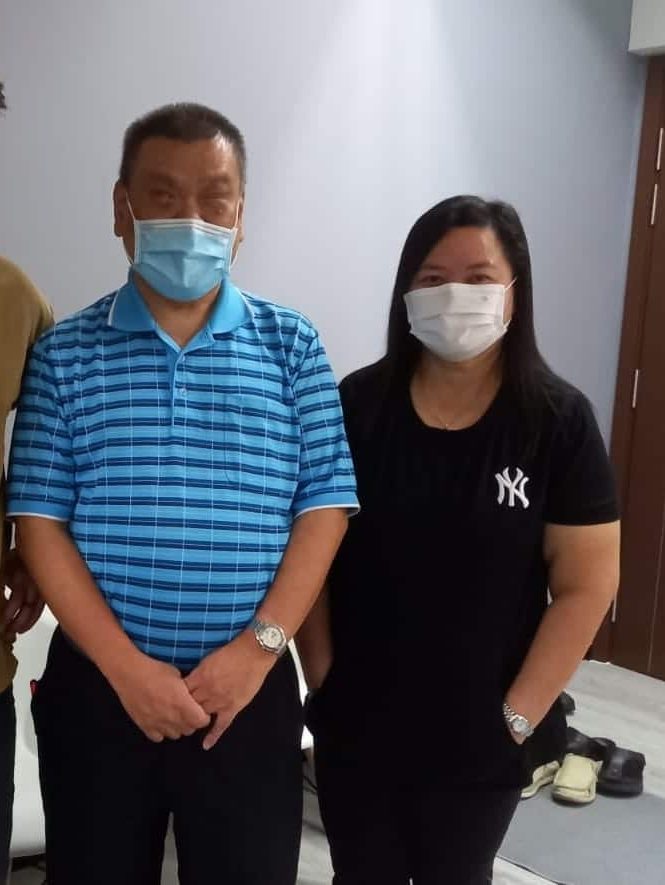
Peter and Emily believe their work is a calling.
“It is whether they want to share or not. When they share, they can be very emotional.”
At the moment, Emily has beneficiaries ranging from 19 to 74. Two whom she mentored over four years have turned their lives around. She even attended the wedding of one of them.
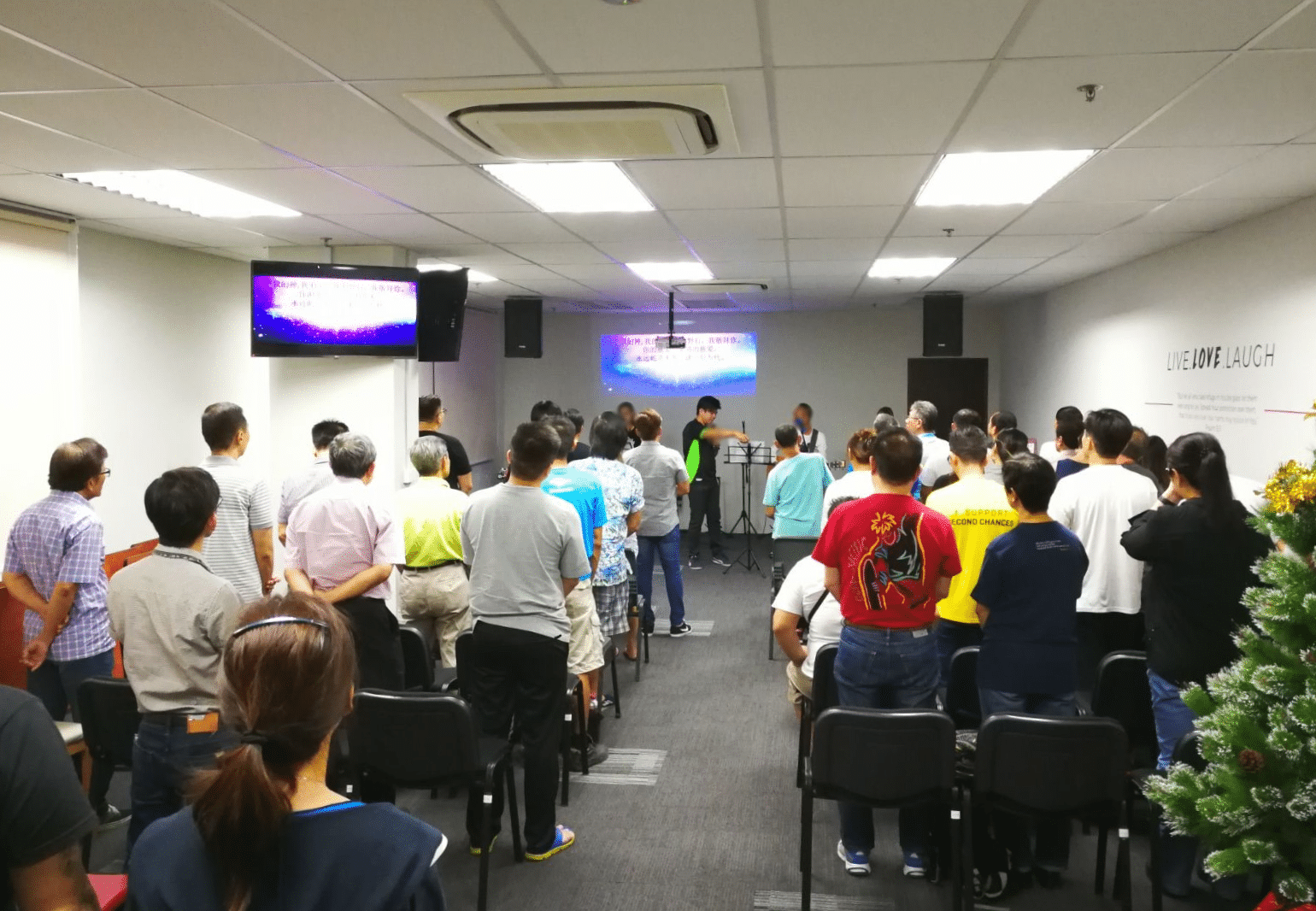
The Men’s Support Group in action.
“They change their lives, they transform, they put God first and even their families can see it.
“That’s why I joined this ministry. I always believe all they need is the right people to hold them till they can stand on their own.
“I have seen God work the impossible.”
“People can’t see God but people can see you. You are a living testimony,” said Emily.
Peter has been with PFS since 2011 and he said that, over the years, he has “received much more than what I give”.
He tells of a young man who was released from prison but had nowhere to go because he had been estranged from his family.
But Peter worked with the family and the man is now reconciled with his mother.
“I have seen God work the impossible. This man was able to forgive his mother and his mother forgave him. It grew my faith.”
RELATED STORIES:
The pain and power of prison ministry: One man’s God-given burden in his God-appointed calling
Former drug addict and his prison officer brew new opportunities for ex-offenders
We are an independent, non-profit organisation that relies on the generosity of our readers, such as yourself, to continue serving the kingdom. Every dollar donated goes directly back into our editorial coverage.
Would you consider partnering with us in our kingdom work by supporting us financially, either as a one-off donation, or a recurring pledge?
Support Salt&Light
